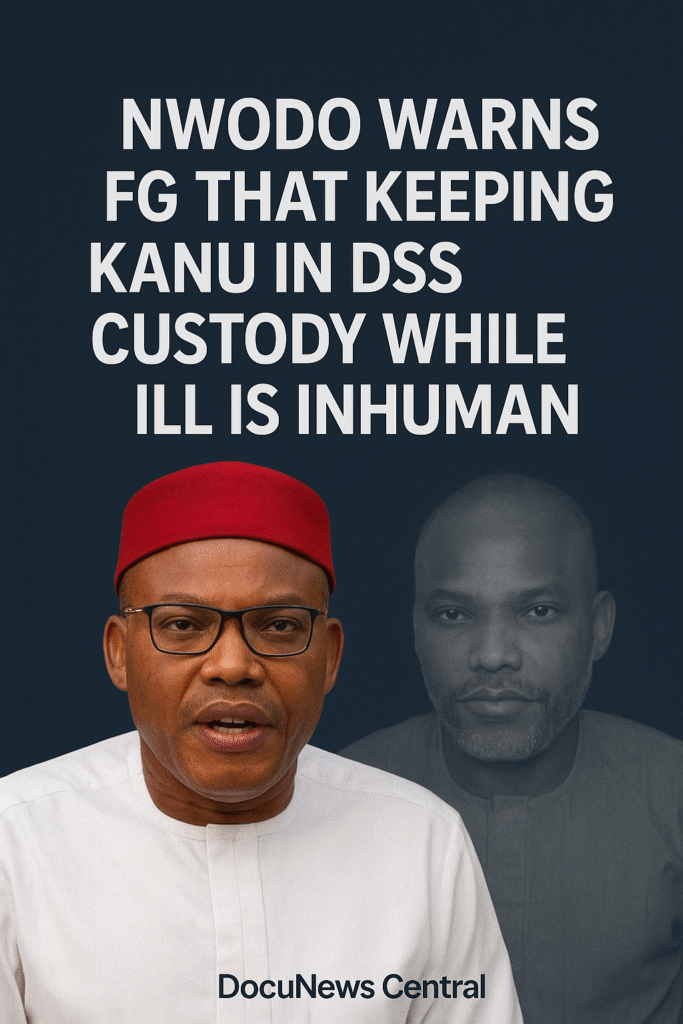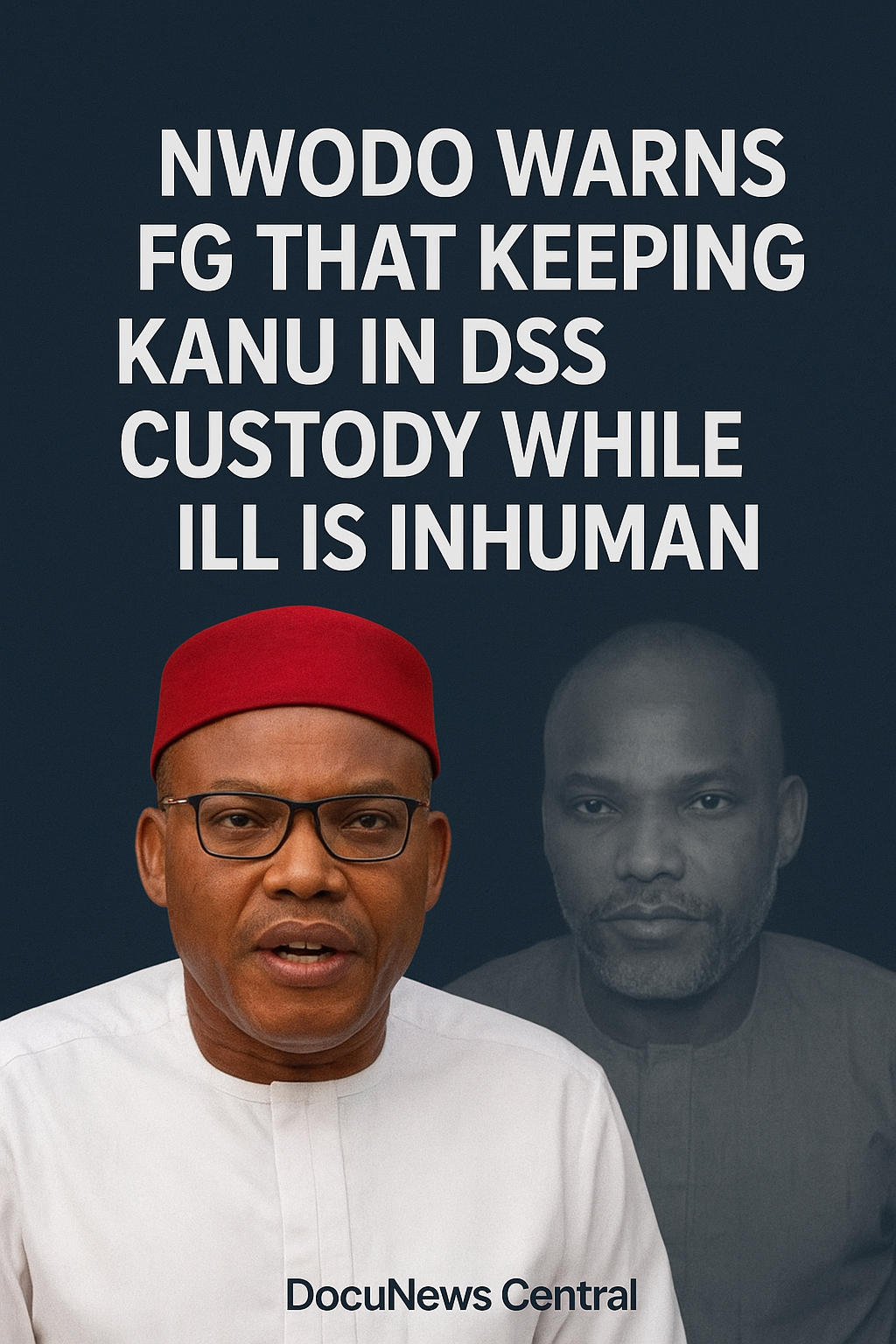NWODO WARNS FG THAT KEEPING KANU IN DSS CUSTODY WHILE ILL IS INHUMAN
By DocuNews Central | October 21, 2025

Summary
Former Enugu State governor and ex-PDP national chairman Okwesilieze Nwodo has called on the Federal Government to release or medically grant access to Nnamdi Kanu, the detained leader of the Indigenous People of Biafra (IPOB). Nwodo described continued detention in DSS custody while ill as “inhuman.” This report explains the legal, humanitarian and political stakes and suggests practical steps the government can take.
Who is Nnamdi Kanu?
Nnamdi Kanu leads IPOB, a group that campaigns for self-determination in Nigeria’s South-East. He holds both Nigerian and British citizenship. His detention since 2021 has sparked national protests and frequent legal challenges. For background reporting, see Reuters, AP and The Guardian. (Reuters, AP, The Guardian).
Nwodo’s Message: A Call to Conscience
On Monday, October 20, 2025, Nwodo spoke publicly about the conditions of DSS custody. He argued that denying proper medical care risks a preventable tragedy. He used plain language. He urged the government to choose humanity and law. He also praised citizens who raised the issue via the #FreeNnamdiKanu protests.
Moreover, he highlighted an obvious inequality. Many top officials travel abroad for treatment. By contrast, a pre-trial detainee has no similar access. Nwodo said that such a double standard undermines trust in public institutions.
Legal and Human-Rights Context
First, under the Nigerian Constitution, every suspect is presumed innocent until convicted. Second, international norms require detainees to receive adequate medical care. Third, Kanu’s arrest and extradition from Kenya drew international attention and legal dispute. For context, read the related coverage by Reuters and AP linked above.
In addition, human-rights groups argue that detention without adequate health care can amount to cruel or degrading treatment. Consequently, many observers now ask whether the state meets its humanitarian obligations while pursuing security and prosecution goals.
Why Release or Medical Access Matters
There are four clear reasons the government should act:
- Save life and dignity: Allowing independent medical care protects a detainee’s life and preserves dignity.
- Uphold the rule of law: Transparent, timely legal process strengthens public trust.
- Reduce regional tension: Sensible action can ease fears in the South-East and help calm protests.
- Protect international standing: Respecting basic rights avoids criticism from foreign governments and rights bodies.
Challenges and Counter-Arguments
Still, the government raises legitimate concerns. It cites national security and ongoing trials. It worries that release may enable further agitation. It also claims that legal authorities and security services supervise detention conditions. These points deserve attention. They also require balanced responses.
Therefore, the debate needs steps that protect security while upholding rights. For example, conditional medical release or supervised bail can satisfy both sides. The courts can order monitoring conditions while preserving prosecution integrity.
Recommended Practical Steps
To balance justice and humanity, the Federal Government could implement the following measures without delay:
- Independent medical evaluation: Allow an independent team from a recognised national hospital to assess Kanu’s condition.
- Medical bail or supervised release: Grant temporary release on strict terms for treatment abroad or in a national hospital, with clear monitoring.
- Transparent reporting: Publish medical findings and detention conditions to rebuild trust.
- Engage regional leaders: Open dialogue with South-East leaders to reduce tensions and discuss legal options.
- Speedy trial scheduling: Ensure timely hearings so the case does not linger indefinitely.
Political Implications for the South-East
Nwodo’s stance carries political weight. He remains a respected figure in Igbo politics. His call signals wider local unease. Therefore, how the government responds will influence regional sentiment and political alignment.
Moreover, the handling of Kanu’s case may shape narratives ahead of future elections. If citizens perceive unfair treatment, it may deepen mistrust. By contrast, a measured, rights-respecting approach can ease friction and present the state as even-handed.
Media Coverage and International Interest
Major international outlets have followed Kanu’s case. They include Reuters, AP and The Guardian. In addition, reputable national outlets such as Vanguard and FirstDaily NG reported on Nwodo’s remarks and the protests. These reports reinforce the public interest and show that the case has both local and global resonance.
Voices from Civil Society
Civil society groups continue to call for lawful, humane treatment. They emphasise legal rights and medical ethics. They also urge the state to avoid actions that could inflame tensions. In short, civil society asks the government to be transparent and to prioritise life and fairness over political point-scoring.
Conclusion
Okwesilieze Nwodo’s warning is clear and urgent. He urged the Federal Government to act before a preventable tragedy occurs. DocuNews Central supports the call for a lawful solution that protects public safety while respecting human dignity.
Finally, the choices the government makes now will matter. Therefore, we recommend independent medical review, transparent communication, and conditional measures that secure both justice and life.
References: Reuters, AP, The Guardian, Vanguard, FirstDaily NG.
Internal links: Nnamdi Kanu | IPOB | DSS custody | Okwesilieze Nwodo | South-East politics.
© 2025 DocuNews Central. All rights reserved. Content may not be reproduced without written permission.











